15% off £20
Henna
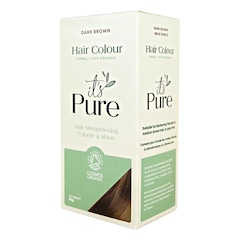
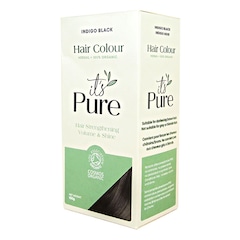
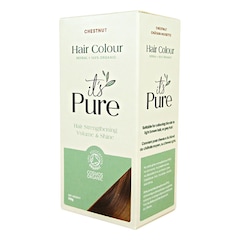
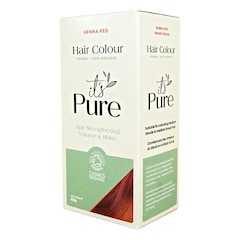
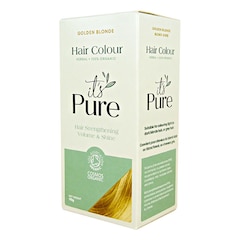
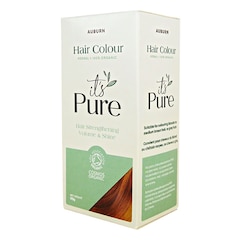
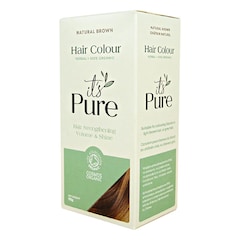
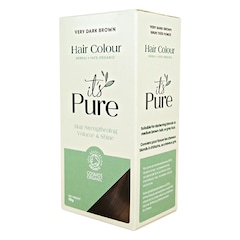
Shop Henna Hair Dye at Holland & Barrett
Henna is the most well-known type of natural hair dye.
Natural henna hair dye is found in the leaves of the Lawsonia inermis plant, and has been used by people in the Middle East and Asia for centuries.
Henna is kind to hair, and fades out after a dozen or so washes, so it is a way to cover up greys or give yourself a new look.
Henna as a dye for hair
Some people only know henna with the temporary tattoos and patterns that are traditional in India.
You will often find henna artists at fairs and festivals and henna tattoos are a popular holiday memory.
However, it is also commonly used worldwide as a natural hair dye.
Henna is a type of semi-permanent hair dye, which usually washes out after a month or two, depending on how often you wash your hair.
Henna is thought to be good for hair as it coats each hair strand with the natural tint, rather than stripping or penetrating it.
Another benefit of henna is that it works with the natural highlights in your hair, to give rich and varied tones, which means it can look much more natural than other dyes.
Types of henna hair dye
Henna for hair comes in various preparations, including powders; blocks that you have to grate and melt, and creams.
One of our favourite brands is Henne Color.
This French brand makes several shades of henna dye, from blondes to blacks, and is easy to apply.
Best of all, it contains no PPD, bleach, ammonia, or synthetics.
It comes as a henna powder, to which you add hot water to make a paste. Once you have done a patch test for allergies and smeared your hairline with something protective, such as a rich skin cream to prevent the colour from getting on your skin, you are good to go and work the cream into your hair.
Naturtint also does a fantastic range of semi-permanent hair colours, based on henna.
Naturtint Reflex Semi-Permanent Hair Colour comes in six shades.
It is a cream formulation, making application fuss-free, and comes with a nourishing hair mask that helps the colour last longer.
The mask contains quinoa, which contains essential proteins, organic shea butter, which deeply moisturises and helps reduce breakages and split ends, and Baobab proteins to help hair’s natural keratin and protect from heat and pollution.
Different types of henna hair colours
As a natural plant-based dye, henna does not claim to come in every shade under the sun.
If you are thinking about going blue, green, or bleach-blonde, this is not the dye for you!
Henna does, however, come in the following shades of browns, blacks, reds and blonde: red henna, black henna, henna auburn, henna mahogany, henna brown, henna blonde and henna copper, among a few other shade variations within those limitations.
Whichever colour you go for, it is important you do not expect the exact shade on the box, unless you have totally white-grey hair.
As henna coats hairs rather than strips them, it works with your natural colours and highlights to change the tone of the hair, rather than the complete colour.
The wonderful thing about this is that henna dyes can look completely natural, with each hair taking on the colour individually, unlike chemical dyes, which create a uniform colour that can look more artificial.
As henna naturally produces an orange-red, to get darker tones, it is mixed with natural indigo dye, while lighter tones come from the cassia plant.
Both these ingredients are plant-based and natural, making henna ideal for vegans.
Shop Henna Hair Dye at Holland & Barrett
Henna is the most well-known type of natural hair dye.
Natural henna hair dye is found in the leaves of the Lawsonia inermis plant, and has been used by people in the Middle East and Asia for centuries.
Henna is kind to hair, and fades out after a dozen or so washes, so it is a way to cover up greys or give yourself a new look.
Henna as a dye for hair
Some people only know henna with the temporary tattoos and patterns that are traditional in India.
You will often find henna artists at fairs and festivals and henna tattoos are a popular holiday memory.
However, it is also commonly used worldwide as a natural hair dye.
Henna is a type of semi-permanent hair dye, which usually washes out after a month or two, depending on how often you wash your hair.
Henna is thought to be good for hair as it coats each hair strand with the natural tint, rather than stripping or penetrating it.
Another benefit of henna is that it works with the natural highlights in your hair, to give rich and varied tones, which means it can look much more natural than other dyes.
Types of henna hair dye
Henna for hair comes in various preparations, including powders; blocks that you have to grate and melt, and creams.
One of our favourite brands is Henne Color.
This French brand makes several shades of henna dye, from blondes to blacks, and is easy to apply.
Best of all, it contains no PPD, bleach, ammonia, or synthetics.
It comes as a henna powder, to which you add hot water to make a paste. Once you have done a patch test for allergies and smeared your hairline with something protective, such as a rich skin cream to prevent the colour from getting on your skin, you are good to go and work the cream into your hair.
Naturtint also does a fantastic range of semi-permanent hair colours, based on henna.
Naturtint Reflex Semi-Permanent Hair Colour comes in six shades.
It is a cream formulation, making application fuss-free, and comes with a nourishing hair mask that helps the colour last longer.
The mask contains quinoa, which contains essential proteins, organic shea butter, which deeply moisturises and helps reduce breakages and split ends, and Baobab proteins to help hair’s natural keratin and protect from heat and pollution.
Different types of henna hair colours
As a natural plant-based dye, henna does not claim to come in every shade under the sun.
If you are thinking about going blue, green, or bleach-blonde, this is not the dye for you!
Henna does, however, come in the following shades of browns, blacks, reds and blonde: red henna, black henna, henna auburn, henna mahogany, henna brown, henna blonde and henna copper, among a few other shade variations within those limitations.
Whichever colour you go for, it is important you do not expect the exact shade on the box, unless you have totally white-grey hair.
As henna coats hairs rather than strips them, it works with your natural colours and highlights to change the tone of the hair, rather than the complete colour.
The wonderful thing about this is that henna dyes can look completely natural, with each hair taking on the colour individually, unlike chemical dyes, which create a uniform colour that can look more artificial.
As henna naturally produces an orange-red, to get darker tones, it is mixed with natural indigo dye, while lighter tones come from the cassia plant.
Both these ingredients are plant-based and natural, making henna ideal for vegans.







